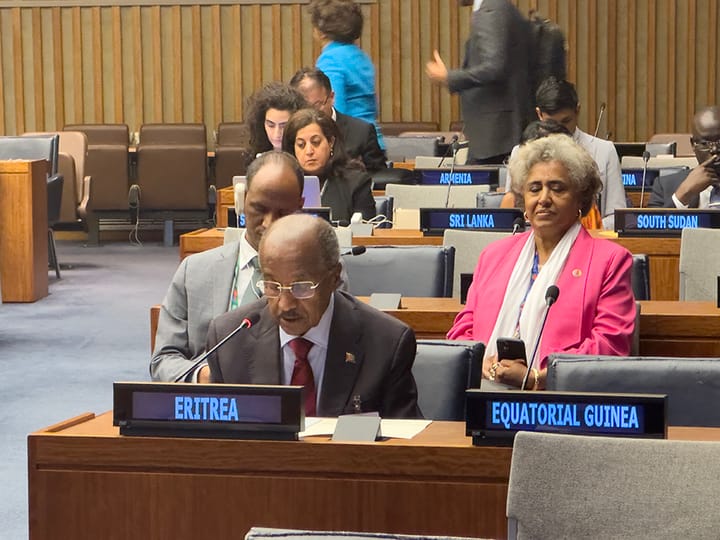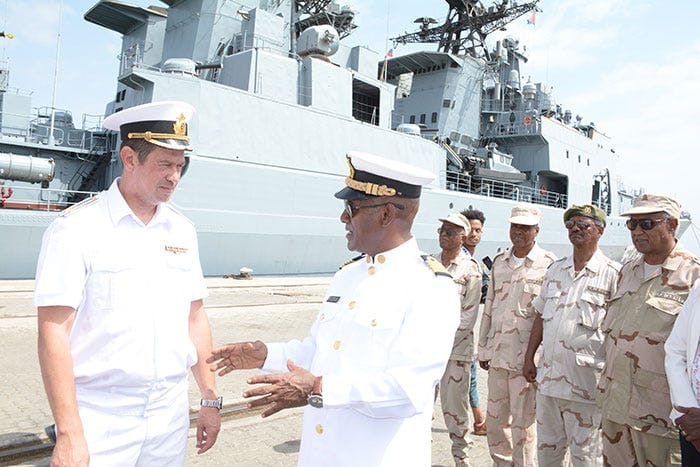Operation Prosperity Guardian: US-Led Red Sea Task Force Sparks Concerns and Questions
US-Led Operation Prosperity Guardian's impact on the Red Sea raises questions about sovereignty, trade disruption, and US relations with Eritrea. #RedSeaTaskForce

Amanuel Biedemariam 12/26/2023
On December 18th, the US Department of Defense issued a statement attributed to Secretary of Defense Lloyd J. Austin III, announcing the launch of "Operation Prosperity Guardian." This new multinational security initiative falls under the" Combined Maritime Forces' oversight, specifically Task Force 153, with a primary focus on securing the Red Sea to ensure freedom of navigation."
The establishment of this task force, along with the coalition, highlights the intricate challenges and dynamics surrounding collaboration in the Red Sea region. Acknowledged as one of the world's most critical international waterways, the Red Sea is a shared responsibility among nations.
Previous reports hinted at the formation of the Combined Maritime Forces and Task Force 153, suggesting the involvement of twelve countries, including Saudi Arabia. However, the recent announcement by the US regarding the task force's composition led to questions about its intentions. While emphasizing the necessity for collective action in addressing international challenges, the countries included primarily comprise Western NATO nations like the United Kingdom, Bahrain, Canada, France, Italy, Netherlands, Norway, Seychelles, and Spain.
Their joint objective is to confront security issues in the southern Red Sea and Gulf of Aden, aiming to safeguard navigation rights and enhance regional stability and prosperity.
This composition has sparked doubts regarding the authenticity of intentions. The coalition, primarily led by the United States and involving primarily Western nations, seeks to counter a non-state threat from the Houthi militia in Yemen. The recent aggressive actions of the Houthi group have disrupted maritime trade routes and activities in the region, affecting Israel and associated cargo ships.
The task force aims to address security threats posed by non-state actors, mainly the Houthi militia in Yemen, whose recent aggressive actions have jeopardized the free flow of commerce and endangered maritime activities.
However, a noteworthy facet is the necessity of involving Red Sea-bordering nations in this coalition. Many major Arab allies of the United States have declined to join the task force.
Countries directly affected by the Red Sea's security landscape, such as Egypt, Saudi Arabia, Sudan, and Eritrea, are notably absent from this multinational endeavor. This absence underscores the intricate nature of forming alliances and coalitions in a region where local intricacies, historical tensions, and geopolitical interests intersect.
This absence also sparks security apprehensions among nations that have observed prior US interventions in places like Libya, Iraq, and Syria. These nations express concerns regarding the Houthi threat and forceful Western actions aimed at curbing the strategic influences of China and Russia in the area. Such actions evoke memories of Cold War-era power struggles, raising anxieties about worsening a fragile regional environment.
The exclusion of Red Sea-bordering countries from the coalition heightens doubts about the initiative's validity and efficacy. The involvement of external powers in managing regional security challenges while intending to safeguard navigation rights might inadvertently stoke existing tensions or be perceived as an imposition of foreign influence.
Furthermore, the situation is complicated by conflicting interests among regional players. The Red Sea holds immense strategic importance for global trade and the geopolitical strategies of multiple regional powers. These powers often maintain diverse alliances and conflicting objectives, making consensus-building daunting.
Escalating conflicts or confrontations in the Red Sea could yield widespread repercussions, disrupting crucial maritime operations and impacting the economies of regional nations and those in Europe and beyond. The potential for unintended escalation underscores the pressing need for inclusive dialogue and diplomatic efforts. Collaborative and inclusive approaches are crucial to address regional security concerns and prevent inadvertent escalations through robust diplomatic channels.
The perception of the US pushing boundaries increasingly raises concerns about potential unwarranted escalation on a global scale. Iran, as reported by the official Iranian official News Agency (ISNA), has issued warnings to the US. Iran's Defense Minister, Mohammad Reza Ashtiani, cautioned that a proposed multinational task force, backed by the United States to safeguard Red Sea shipping, would encounter significant hurdles. He explicitly stated, "If they proceed with such an irrational step, they'll encounter formidable obstacles," emphasizing that "No entity can take action in a region where our influence predominates," explicitly alluding to the Red Sea task force.
The aggressive stance of the US and its Western allies carries significant global repercussions. The reactions from regional nations could be strongly adverse, leading to stringent measures against Western interests. This, in turn, can potentially halt international trade and maritime activities, critically impacting significant economies worldwide.
To de-escalate tensions, the US should play a role in fostering peace in Palestine, facilitating uninterrupted global trade, and maintaining open passage for international shipping routes—failure to do so risks damaging the US's global standing and plunging European economies into turmoil.
How might the presence of an international military task force in the Red Sea region impact Eritrea's security, economy, diplomatic relations, strategic positioning, and socio-political landscape? Specifically, what concerns could arise regarding Eritrea's sovereignty due to the task force's operations? Will the task force disrupt or alter shipping routes that could affect Eritrea's trade and commerce? Lastly, how could the task force influence Eritrea's diplomatic relationship with the United States?
The answers are not necessarily straightforward. The international military task force in the Red Sea could influence Eritrea's security, economy, diplomacy, strategic stance, and socio-political dynamics positively or negatively. Concerns about sovereignty might arise due to the task force's operations potentially infringing Eritrea's autonomy. Shipping route alterations by the task force could impact Eritrea's trade and commerce.
Regarding diplomatic relations with the US and the West, the task force's presence might prompt the US to reconsider its ties, potentially altering the nature of their relationship.
Conclusion: How effectively can Operation Prosperity Guardian preserve navigation freedom in the Red Sea? Its success and sustainability will depend on many factors. Can the US defeat the Houthis militarily? What are the chances of the US deploying ground troops and clearing the region of Houthis and other irregular forces? The US would suffer a massive setback if it failed to defeat the Houthis. A possible US military intervention might also close off the Red Sea, disrupting global commerce and worsening the economic crisis of Europe, which is already struggling because of the Ukrainian conflict. Has the US effectively presented its case to collaborate with Red Sea nations? None have joined yet, highlighting the delicate balance between global involvement and regional sensitivities essential for addressing complex security challenges along this vital maritime corridor. The hurried approach by the US raises concerns about sustaining the campaign in the long term.
If this text is important, please subscribe and consider donating to support our growth.





Comments ()